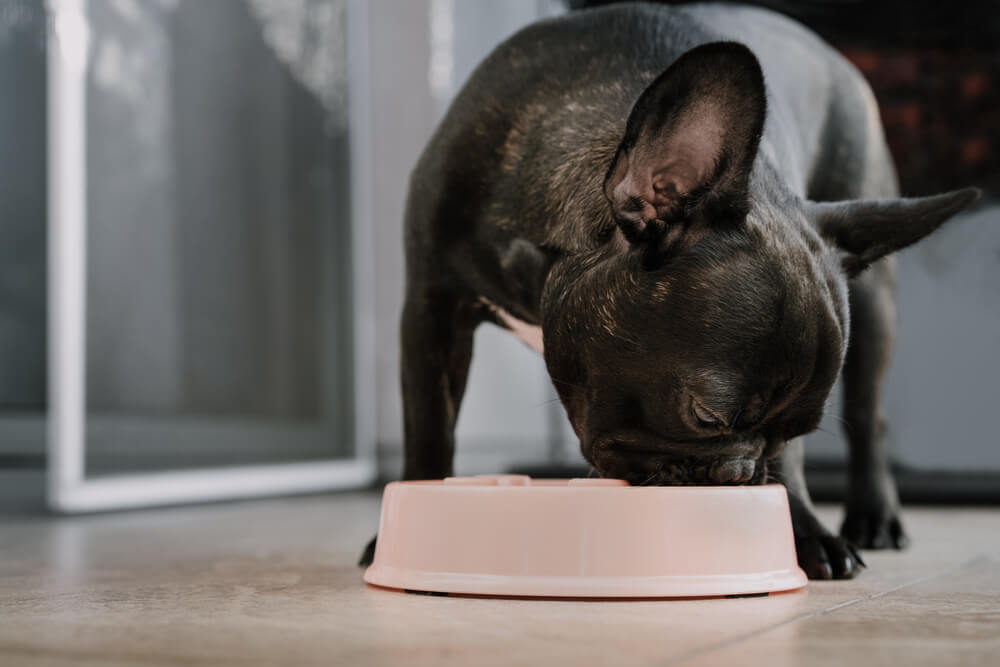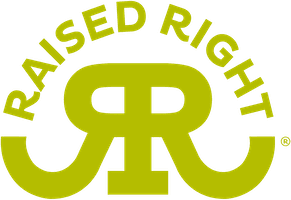
French Bulldogs are an incredibly popular breed at the moment. Sadly, the demand for French Bulldogs has led to intense and irresponsible breeding that has left the breed with many health issues including breathing difficulties, painful eye conditions, and sore skin. One health condition that French Bulldogs appear to be prone to is food allergies. Let’s find out about French Bulldog food allergies and how to diagnose and treat them.
What is a food allergy?
Allergies occur when a dog’s body mounts an excessive and hypersensitive response to an allergen. An allergen can be anything from a substance in flea saliva or house dust mite poop, to a certain food or pollen.
How common are food allergies in French Bulldogs?
Although other allergies seem to be more common than food allergies in dogs, food allergies do exist. It’s hard to know for certain how many dogs have allergy symptoms caused by food allergens because not all dogs are allergy tested to find the underlying cause. Even if a dog isn’t truly allergic to a food, they may still have a sensitive stomach or get a tummy upset after eating certain foods.
What are the symptoms of French Bulldog food allergies?

An allergic rash normally starts as slightly pink inflamed skin and progresses to bright red because scratching and licking of the area by your dog usually cause infection.
Food allergies can cause a variety of symptoms, including:
Itchy skin
Itchy skin and rashes caused by allergies are known as atopic dermatitis. Atopic dermatitis often affects the skin of the muzzle, feet, tummy, ears, armpit, and groin, although any area of skin can be affected. An allergic rash normally starts as slightly pink inflamed skin and progresses to bright red, oozy, and sometimes smelly lesions. This is because scratching and licking of the area by your dog usually cause infection.
Ear infections
The ear canals are lined by skin, so just as the skin elsewhere on your dog can be affected by allergies, so can the ears. Once the skin of the ear canal becomes inflamed, bacteria may take the opportunity to invade and cause an ear infection. You might notice your dog shaking their head or scratching at their ears because ear infections can be very itchy and painful.
Hives
You might associate allergies with hives, especially in people. Well, dogs can get hives too! Hives are raised lumps on the skin, and they can make your dog’s fur look like it’s sticking out and won’t sit flat. Food allergies don’t usually cause hives or other swellings, but it does happen occasionally.
Diarrhea

Diarrhea might be liquid, paler than normal, or containing mucus and sometimes even spots of fresh red blood can be seen.
Not all symptoms of food allergies are related to the skin. Food allergies can also cause a runny tummy. The diarrhea might be liquid, paler than normal, or containing mucus. Sometimes, spots of fresh red blood can be seen. If your dog has any amount of blood in their stools, you should speak to your veterinarian just in case.
Vomiting
Vomiting is an unusual symptom of food allergies and is more common with gut sensitivity. However, since there are much more common causes, it’s best not to assume your dog has a food allergy if they’re vomiting, especially if their other symptoms don’t match up.
How do you find out if your French Bulldog has a food allergy?
The only way to be certain whether your dog has a food allergy, and find out what is causing it, is by having them allergy tested. Allergy testing can be done with a skin patch test, but a blood test is more widely used. A series of blood tests will identify what type of allergy your dog has, and then narrow it down to a particular plant pollen, mold, insect, or food. It’s unusual for the results to show just one allergen, and far more likely that your dog will tests positive for multiple allergies, even if they’re not showing signs.
If you decide against allergy testing, you can try changing your dog’s diet to identify a possible food allergy. Choosing a limited ingredient diet that is low carb and doesn’t contain any preservatives can be helpful. If you cut out all treats and stick to this diet exclusively, you’ll be able to spot whether their symptoms improve. Although symptoms can improve in a couple of weeks, you shouldn’t make a decision as to whether it’s working until 6 or 8 weeks, as improvement could be delayed.
How do you treat French Bulldog food allergies?

A limited ingredient diet can be helpful as it contains fewer allergen triggers than diets with long ingredient lists.
Sadly, allergies can’t be cured, only managed. Medication is often required periodically to control your dog’s allergy symptoms. Therefore, if they’re experiencing a flare-up, it’s best to contact a vet. However, the mainstay of managing your dog’s food allergy is to remove the food allergen from their diet. Choosing a limited ingredient diet that uses a single protein source should help, while a fresh, lightly cooked diet should contain fewer allergen triggers than an overly processed diet with long ingredient lists. Grain free diets can also help, especially if the allergen is from a plant-based protein, but be sure to source a nutritionally complete and balanced dog food, rather than making one at home. Homemade diets can cause nutritional problems for your dog if the amounts of vitamins and minerals are not correct.
Summary
French Bulldogs are commonly affected by allergies, and it seems many of these are food allergies. By making sure that your dog’s food contains the fewest ingredients possible, you have more control over what you’re putting into their bodies. That way, you should be able to control their allergy symptoms, and you can more easily spot symptom patterns and identify any new food sensitivities
FAQ
What is the most common food allergy in French Bulldogs?
Chicken and beef are the most common food allergies in dogs. However, it’s still important that dogs get the right amount of protein in their diet, so choosing a dog food with limited ingredients could help you avoid the culprit.
How do you know if your Frenchie is allergic to food?
Allergy symptoms vary from itchy skin and rashes to diarrhea and flatulence. To find out if the allergy is caused by food your vet can take a blood sample and send it for allergy testing.
What food is best for a French Bulldog with allergies?
Limited ingredient dog food can help to avoid certain allergens. Grain free diets can also be useful if your dog is allergic to plant-based proteins.



